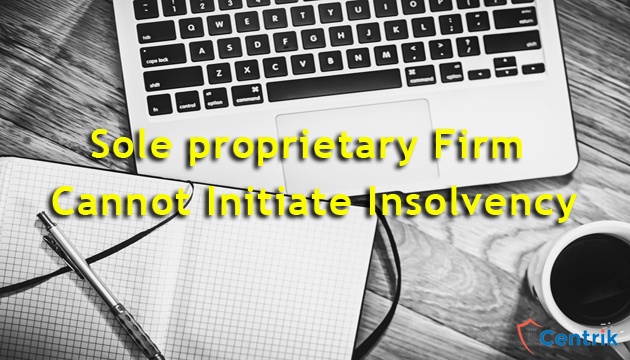
Status as on- 02/01/2020
Business environment of the Country had been changes with the great advances through the with the passing of the Insolvency and Bankruptcy Code which has also been recognized through International indexes like the World Bank’s Ease of Doing Business 2020 where India ranked 63 compared to 2019’s 77th Position. Celebrated amendments to the IBC include the inclusions of NBFCs into its fold and the reduction on liquidation timelines from 2 years to one. However, the Sole Proprietorships are not permitted to exploit the boons of the IBC Code as they fail to fall within the category of Corporate Persons under section 3(23) of the IBC.
R.G. STEELERS vs. BERRY AUTO ANCILLARIES PVT. LTD.
In the present case, the NCLT refused to initiate Insolvency proceedings against, M/s Berry Auto Ancillaries Pvt. Ltd. on the basis of application under section 9 made by the Operation Creditor Being Sole Proprietor on the grounds that it was not a person as defined under section 3(23) of the IBC Code, the provisions read as follows;
“(23) “person” includes— (a) an individual; (b) a Hindu Undivided Family; (c) a company; (d) a trust; (e) a partnership; (f) a limited liability partnership; and (g) any other entity established under a statute, and includes a person resident outside India;”
The Hon’ble NCLT held that;
“…by virtue of definition as contained in section 3(23) of IBC, 2016 a person even though includes an individual it does not include within its ambit a Sole Proprietary Concern”
This order is in line with previous decisions of the High Court which have held that Sole Proprietorships are not legal entities which can sue or be sued as it is not a legal entity like a registered partnership firm or a Company.
It is important to note that the NCLT did also considered the fact that the debt claim was under dispute thus section 9 application was also not permissible under such grounds.
POINTS FOR CONSIDERATION
Although sole proprietorship firms form a part of the Micro Small & Medium Enterprises Sector (MSME) for whom the Government has enacted the Micro Small and Medium Enterprises Development Act 2006, which enables MSME’s to approach the “Industry Facilitation Council” to recover delayed payments through conciliation and arbitration even in the absence of an arbitration agreement.
It is also interesting to note that the High Court of Calcutta in the case of Devendra Surana vs Bank of Baroda & Ors, in its 2018 judgment ruled that individual and sole proprietors are the same legal entity. Thus following this reasoning there may be a possibility given if all other conditions of the relevant section are fulfilled that initiation of the Corporate Insolvency Resolution Process can be done in the name of the Individual who is the owner of a Sole Proprietorship.
Disclaimer: The above article is based on the recent order by Courts, news, publications and views from different sources. We don’t certify any of the information contained therein. The readers are expected to take expertise opinion before relying on the article. The readers are expected to take expert opinion before relying on this contention. For any support, please reach us at support@centrik.in




 join For Updates
join For Updates